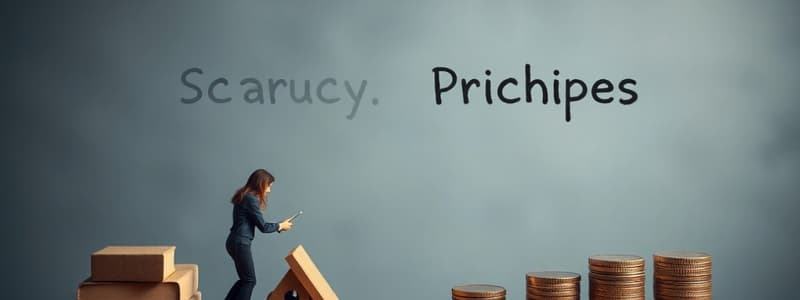Podcast
Questions and Answers
What does the production possibility curve (PPC) primarily illustrate?
What does the production possibility curve (PPC) primarily illustrate?
- The production capabilities in a growing economy
- The efficiency of resource allocation in multiple sectors
- The concept of scarcity and opportunity cost (correct)
- The relationship between supply and demand
Which assumption is NOT made when constructing the production possibility curve?
Which assumption is NOT made when constructing the production possibility curve?
- Technology is constantly improving (correct)
- The economy is operating at full employment
- Resources can be allocated among different uses
- Factors of production are fixed in supply
What must occur if an economy wants to increase the production of one good according to the PPC?
What must occur if an economy wants to increase the production of one good according to the PPC?
- Increase technology efficiency
- Reduce the production of another good (correct)
- Enhance labor productivity
- Increase the supply of resources
The slope of the production possibility curve measures what?
The slope of the production possibility curve measures what?
In the context of the production possibility curve, points lying below the curve represent what?
In the context of the production possibility curve, points lying below the curve represent what?
What happens to the PPC when there is a technological improvement?
What happens to the PPC when there is a technological improvement?
Why does the PPC typically only consider two goods in its representation?
Why does the PPC typically only consider two goods in its representation?
What do the points marked below the PPC curve indicate?
What do the points marked below the PPC curve indicate?
What may occur if a government prioritizes equity over efficiency?
What may occur if a government prioritizes equity over efficiency?
What is opportunity cost fundamentally about?
What is opportunity cost fundamentally about?
What is the primary concern regarding the production of goods in an economy?
What is the primary concern regarding the production of goods in an economy?
How does the production possibilities curve (PPC) represent opportunity cost?
How does the production possibilities curve (PPC) represent opportunity cost?
Which of the following statements accurately reflects the tradeoff between equity and efficiency?
Which of the following statements accurately reflects the tradeoff between equity and efficiency?
Which of the following factors of production can be considered when deciding how to produce goods?
Which of the following factors of production can be considered when deciding how to produce goods?
Which question is NOT typically addressed by economics?
Which question is NOT typically addressed by economics?
Which question is concerned with the distribution of goods produced?
Which question is concerned with the distribution of goods produced?
What is the ideal situation regarding equity and efficiency as discussed?
What is the ideal situation regarding equity and efficiency as discussed?
When considering 'how to produce', which of the following methods can be employed?
When considering 'how to produce', which of the following methods can be employed?
What is a challenge in determining what goods are important to produce?
What is a challenge in determining what goods are important to produce?
During decision-making, which scenario exemplifies the concept of opportunity cost?
During decision-making, which scenario exemplifies the concept of opportunity cost?
If society emphasizes efficiency, what is a likely consequence?
If society emphasizes efficiency, what is a likely consequence?
Which production method might be chosen to generate electricity?
Which production method might be chosen to generate electricity?
What issue does the question 'for whom to produce?' primarily address?
What issue does the question 'for whom to produce?' primarily address?
Which combination of factors might be considered to enhance production efficiency?
Which combination of factors might be considered to enhance production efficiency?
What does an outward shift in the production possibility curve indicate?
What does an outward shift in the production possibility curve indicate?
What is meant by opportunity cost in the context of the production possibility curve?
What is meant by opportunity cost in the context of the production possibility curve?
Which of the following is NOT one of the basic economic questions?
Which of the following is NOT one of the basic economic questions?
What happens if an economy is operating under the production possibility curve?
What happens if an economy is operating under the production possibility curve?
When reallocating resources to produce more defense goods, what must the economy sacrifice?
When reallocating resources to produce more defense goods, what must the economy sacrifice?
Why is it important for an economy to decide what goods and services to produce?
Why is it important for an economy to decide what goods and services to produce?
How does a movement from point A to point B on the production possibility curve typically affect consumer goods?
How does a movement from point A to point B on the production possibility curve typically affect consumer goods?
What does the product mix in an economy refer to?
What does the product mix in an economy refer to?
What determines what goods and services are produced in a capitalist economy?
What determines what goods and services are produced in a capitalist economy?
Which factor is not emphasized in a capitalist economy when determining how to produce goods?
Which factor is not emphasized in a capitalist economy when determining how to produce goods?
In a socialist economy, who decides what goods are produced?
In a socialist economy, who decides what goods are produced?
How does a capitalist economy decide who receives the goods produced?
How does a capitalist economy decide who receives the goods produced?
What is meant by the 'Invisible Hand' in a market economy?
What is meant by the 'Invisible Hand' in a market economy?
What is a primary concern for producers in a market economy when choosing a production method?
What is a primary concern for producers in a market economy when choosing a production method?
In a command economy, who controls the allocation of resources?
In a command economy, who controls the allocation of resources?
Which production factor is typically not prioritized in a socialist economy?
Which production factor is typically not prioritized in a socialist economy?
What is the primary focus of economics as a field of study?
What is the primary focus of economics as a field of study?
What does the term 'ceteris paribus' refer to in economics?
What does the term 'ceteris paribus' refer to in economics?
What is an example of a trade-off an individual might face?
What is an example of a trade-off an individual might face?
What assumption underlies the behavior of rational consumers?
What assumption underlies the behavior of rational consumers?
In economic terms, what does efficiency imply?
In economic terms, what does efficiency imply?
What is an inherent aspect of trade-offs in economic decision-making?
What is an inherent aspect of trade-offs in economic decision-making?
What do societies often need to balance between in their economic decisions?
What do societies often need to balance between in their economic decisions?
Which of the following best describes economic activity?
Which of the following best describes economic activity?
Flashcards
Economics
Economics
The study of how choices are made with limited resources to satisfy unlimited wants.
Economic Activity
Economic Activity
The buying and selling activities within an economy.
Rationality (Economics)
Rationality (Economics)
The assumption that economic agents (consumers and producers) make choices to maximize their well-being (utility or profit).
Ceteris Paribus
Ceteris Paribus
Signup and view all the flashcards
Trade-Off
Trade-Off
Signup and view all the flashcards
Efficiency (Economics)
Efficiency (Economics)
Signup and view all the flashcards
Equity (Economics)
Equity (Economics)
Signup and view all the flashcards
Consumer Utility
Consumer Utility
Signup and view all the flashcards
Production Possibility Curve (PPC)
Production Possibility Curve (PPC)
Signup and view all the flashcards
Scarcity
Scarcity
Signup and view all the flashcards
Opportunity Cost
Opportunity Cost
Signup and view all the flashcards
Full Employment
Full Employment
Signup and view all the flashcards
Fixed Factors of Production
Fixed Factors of Production
Signup and view all the flashcards
PPC Curve Points
PPC Curve Points
Signup and view all the flashcards
Slope of PPC
Slope of PPC
Signup and view all the flashcards
Constant Technology
Constant Technology
Signup and view all the flashcards
Equity vs. Efficiency
Equity vs. Efficiency
Signup and view all the flashcards
Economic Questions
Economic Questions
Signup and view all the flashcards
PPC and Scarcity
PPC and Scarcity
Signup and view all the flashcards
What to produce?
What to produce?
Signup and view all the flashcards
How to produce?
How to produce?
Signup and view all the flashcards
For whom to produce?
For whom to produce?
Signup and view all the flashcards
Whom to produce for?
Whom to produce for?
Signup and view all the flashcards
Factors of production
Factors of production
Signup and view all the flashcards
Capital goods
Capital goods
Signup and view all the flashcards
Consumer goods
Consumer goods
Signup and view all the flashcards
Defense goods
Defense goods
Signup and view all the flashcards
Production methods
Production methods
Signup and view all the flashcards
Shifting PPC Outward
Shifting PPC Outward
Signup and view all the flashcards
Operating Under the PPC
Operating Under the PPC
Signup and view all the flashcards
Opportunity Cost of Producing More
Opportunity Cost of Producing More
Signup and view all the flashcards
Invisible Hand
Invisible Hand
Signup and view all the flashcards
Market Mechanism
Market Mechanism
Signup and view all the flashcards
Demand Signals
Demand Signals
Signup and view all the flashcards
Profit Maximization
Profit Maximization
Signup and view all the flashcards
Cost Minimization
Cost Minimization
Signup and view all the flashcards
Resource Allocation (Market Economy)
Resource Allocation (Market Economy)
Signup and view all the flashcards
Government Controlled Economy
Government Controlled Economy
Signup and view all the flashcards
Society's Role (Government Controlled Economy)
Society's Role (Government Controlled Economy)
Signup and view all the flashcards
Study Notes
Economics Introduction
- Economics solves problems of unlimited wants with scarce resources.
- It studies choices and human behavior, particularly the production, distribution, and consumption of goods and services.
- It's a science in its methodology and an art in its application.
Economic Activity
- It's all the buying and selling in an economy over time.
Assumptions in Economics
- Rationality: Economic agents (consumers and producers) act rationally. Consumers maximize utility, producers maximize profits/minimize costs.
- Ceteris Paribus: "All other things being equal." Economists isolate relationships by holding everything else constant.
Trade-offs
- Choices involve trade-offs. Obtaining one thing often means giving up another.
- Examples include food vs. clothing, work vs. leisure, and equity vs. efficiency.
Efficiency vs. Equity
- Efficiency: Maximizing output from scarce resources.
- Equity: Fair distribution of resources and benefits among society's members.
- Trade-off exists between the two. Pursuing one often means sacrificing the other.
Opportunity Cost
- Cost of the next best alternative forgone.
- Every decision involves choosing one option over others; the value of the next best choice.
- Decisions require cost-benefit analysis.
Production Possibility Curve (PPC)
- Shows combinations of two goods an economy can produce at full employment, given resources and technology.
- Demonstrates scarcity and opportunity cost (to produce more of one thing, you must produce less of another).
- The slope represents opportunity cost; moving along the curve indicates trade-offs. Points outside the curve are unattainable, and points inside the curve are inefficient.
Basic Questions in Economics
- What to produce?: Determining what goods/services to produce based on demand and resources.
- How to produce?: Choosing the most efficient production methods.
- For whom to produce?: Deciding how to distribute the goods/services.
Positive vs. Normative Economics
- Positive: Based on facts, describes the world as it is.
- Normative: Based on subjective values and beliefs, describes how the world should be.
Studying That Suits You
Use AI to generate personalized quizzes and flashcards to suit your learning preferences.




